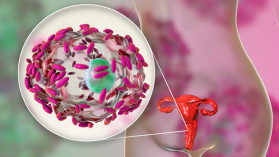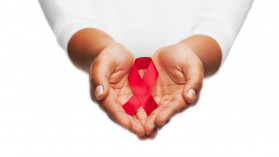Get Informed Topics Safer Sex & STIs Types of STIs GENITAL HERPES
GENITAL HERPES
What is Genital Herpes?
- Genital Herpes is a very common infection that is usually sexually transmitted.
- It is caused by a virus called the herpes simplex virus (HSV) There are two types of HSV:
- HSV 1 usually causes herpes on the mouth. People with this virus can get cold sores or fever blisters on the mouth. However, unprotected oral sex with someone who has herpes on the mouth can spread it to someone’s genitals or anus (butthole).
- HSV 2 usually causes herpes around the genitals or anus. People with this virus can get sores around their genitals or anus. However, unprotected oral sex with someone who has herpes on the genitals* or anus can spread it to someone’s mouth.
- Herpes cannot be cured but it can be managed by medication.
- When someone has active sores (sores that they can feel and see), it is called having an “outbreak”. Many people who have herpes never have an outbreak.
How do you get Genital Herpes?
- You are most likely to get herpes from someone when they are having an outbreak or feel the tingling or itching that suggests an outbreak is about to happen. However, herpes can be spread even if the person with the virus isn’t currently having an outbreak or has never had an outbreak.
- You do not need to have sexual intercourse to get herpes. Herpes is transmitted through skin-to-skin contact with someone who already has herpes.
- You can get herpes on the mouth if you kiss someone who has herpes on the mouth or if you perform oral sex on the genitals or anus of someone who has herpes on the genitals or anus.
- You can get herpes on the genitals if you have genital skin-to-skin contact with someone who has herpes on the genitals or anus or if someone with herpes on the mouth performs oral sex on your genitals or anus.
- You can spread herpes if you are sharing sex toys and you don’t disinfect them or put a new condom on them when a new person uses the toys.
- If you touch one of your sores and then touch another part of your body, it is possible to spread the virus to that part of your body.
- A pregnant person can pass on the virus to their baby during childbirth.
How do you know if you have Genital herpes?
- Many people who have herpes never have an outbreak.
- If someone is going to get an outbreak, sores usually show up 2-20 days after getting the virus. The skin may itch or tingle before sores develop.
- When someone has their first outbreak, they may feel like they have the flu, have pain in their muscles and joints, and find it painful to urinate (pee).
How and where can you get tested for herpes?
- You can get tested for hepatitis B at some specific public or private health facilities in your area. Find a clinic near you in the clinic finder here (Link)
- If you notice anything on your genitals or near your mouth that looks unusual, see your clinician right away. They will look at the area and take a swab of the sore to see if it’s herpes. This is the most common way to get tested for herpes.
What if you test positive for herpes?
- If you test positive for herpes, it means you have it.
- Even though herpes can’t be cured, there is treatment available to manage your outbreaks.
- Some people take medication on a regular basis to make outbreaks less frequent and to reduce the chance of passing on the virus to others.
- Your clinician can also prescribe a medication that you take when you have an outbreak. You should start this medication as soon as possible, or within 72 hours of first noticing symptoms. It can make the outbreak shorter and less uncomfortable.
- Over time, outbreaks tend to become less frequent and milder. Some people will get outbreaks once a month or once every few months. 1 in 10 people will experience only 1 outbreak ever.
- You may find you are more likely to get an outbreak if:
- You are tired, under stress, or sick.
- You are not eating or sleeping well.
- You spend too much time in the sun.
- You have your period.
- You are taking certain medications.
- You are pregnant.
- You are HIV positive or have another condition that affects your immune system.
How can you lower your risk of getting Genital herpes and/or passing it on to your partner(s)?
- Make informed decisions. Talk to your partner(s) about STIs and the use of safer sex tools such as condoms.
- Use condoms on penises or dildos for vaginal or anal sex, use latex gloves for finger play and fisting, and use condoms/dams for oral sex to lower your chances of getting or transmitting herpes.
- Because condoms do not cover the entire area affected by herpes, they do not provide the same level of protection from herpes as they do for most other STIs. However, they can still reduce the risk of transmitting herpes.
- If you are sharing sex toys, be sure to disinfect them or put a new condom on them when a new person uses the toys.
- You are most likely to spread herpes during an outbreak or right before one is about to happen. Avoid oral sex when you have cold sores around the mouth, and avoid vaginal and anal sex if you have an outbreak of herpes on the genitals or anus.
- If you have herpes, talk to your clinician about medications that may reduce the odds of passing herpes to a partner.
- Avoid sharing objects that come into contact with your mouth during an outbreak of herpes on the mouth such as a spoon. It is unlikely to spread herpes on the mouth this way but it is possible.
What can you do when you have a herpes outbreak?
- See your clinician as soon as possible or within 72 hours to consider medication.
- Keep the area where the sores are clean and dry.
- Wear cotton underwear and loose fitting clothes. Don’t wear underwear when you sleep.
- Limit your time in the sun.
- If it hurts when you urinate (pee), sit in a tub of warm water to urinate, or pour water over the area while you pee.
- Apply ice packs to the sores to reduce pain.
- Wash your hands if you touch an area with sores. Avoid touching your mouth or eyes after you touch the sores because this could spread herpes to the area. Also wash any bath towels you have used before you use them again.
Partner Notification
- If you are diagnosed with genital herpes, it is important that you or someone from the public health department notify your past sexual partners so they can be tested and treated. Your name is not disclosed when a sexual partner is contacted.
Frequently Asked Questions
Male Body
1 questions
See frequently asked questions on Male Body
Let's Talk
Facts, tips, stories and common questions
Go to Forum




